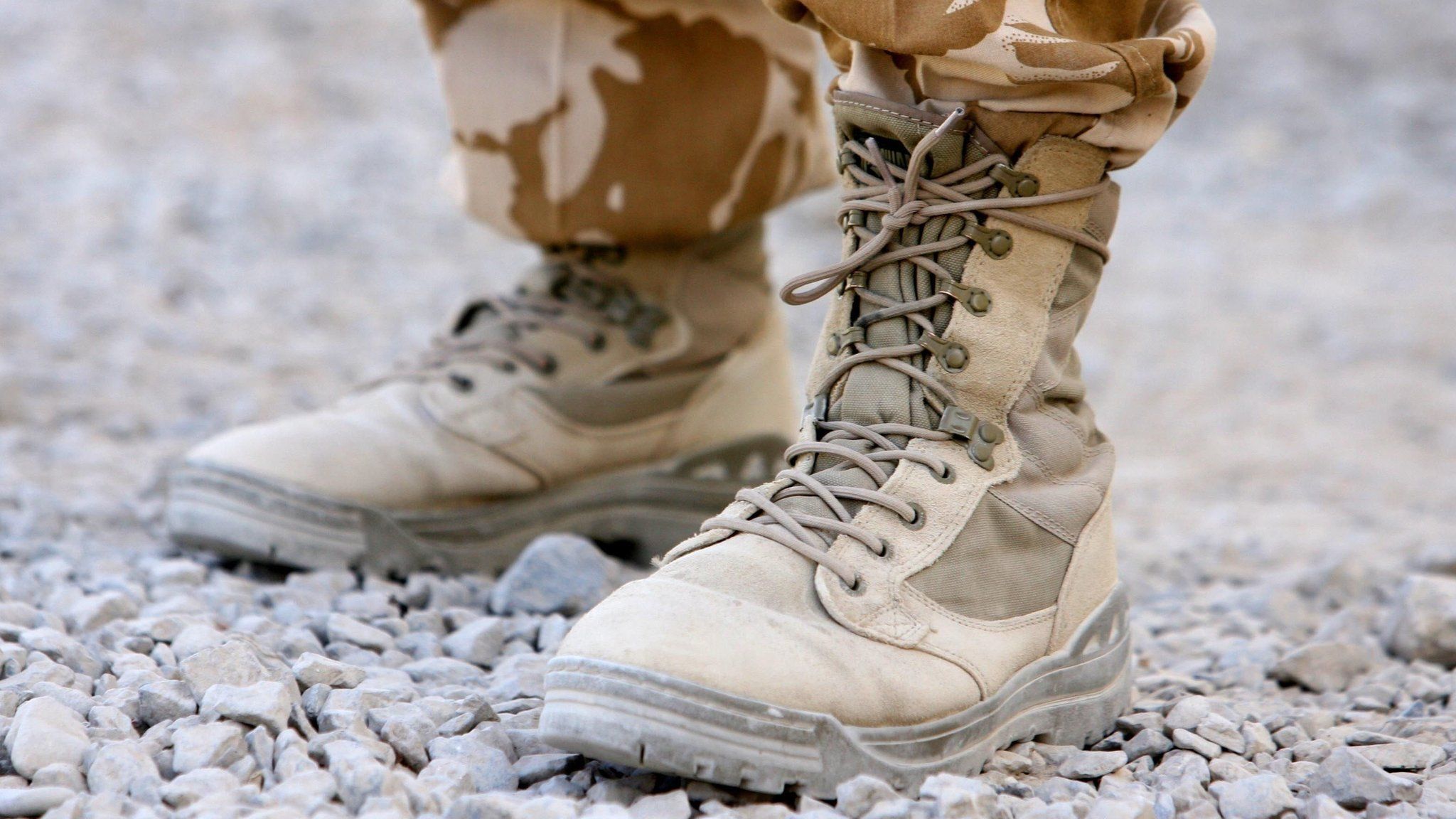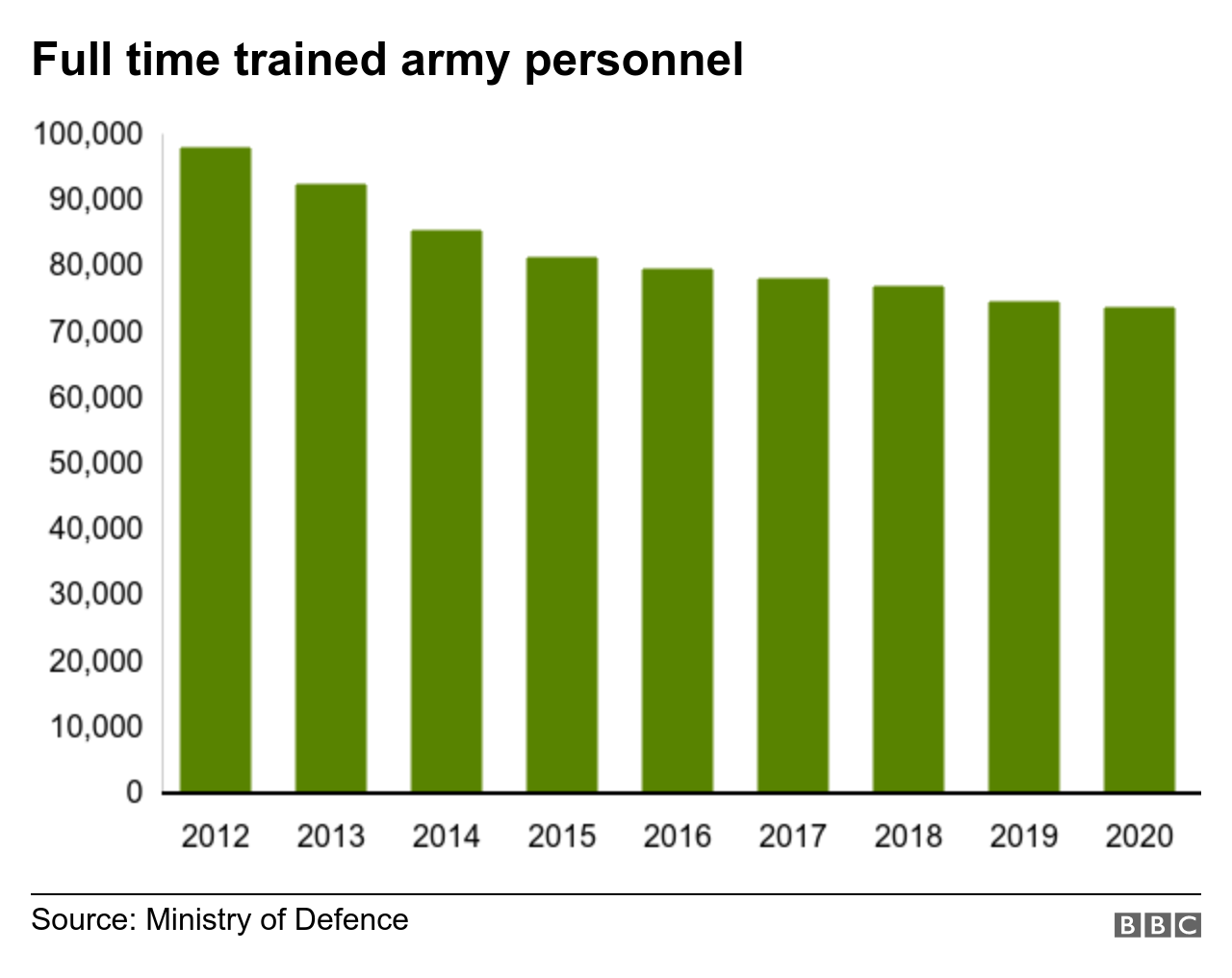
The size of the Army is expected to be reduced by about 10,000 soldiers as part of a move towards robots, drones, and cyber warfare.
The defence review is likely to see the loss of some tanks and aircraft - but the government said there would be "more ships, submarines and sailors".
Numbers in the regular Army will be reduced to about 70,000 soldiers, having already fallen in recent years.
Defence Secretary Ben Wallace will make a statement in the Commons later.
On Sunday, he told BBC One's Andrew Marr Show he was making decisions in the context of an increased defence budget.
But Labour said the number of soldiers was being cut despite an increase in threats facing the UK.

There were 80,010 soldiers in the UK's regular Army in January 2021, latest figures showed, down from 86,080 in October 2015.
The latest reduction in the number of soldiers could be made through "natural" movement, with those who leave the service not replaced by new recruits.
As part of the military restructure, the Royal Marines will be transformed into a new Future Commando Force, taking on many of the traditional tasks of the special forces - the SAS and SBS.
The force will receive more than £200m of direct investment over the next decade to carry out maritime security operations and to "pre-empt and deter sub-threshold activity, and counter state threats".
Following the publication last week of the separate so-called integrated review of foreign and defence policy, ministers have said big changes are necessary to create a more agile military.
As part of that review, the government increased the cap on UK nuclear warheads from 180 to 260.

'The most significant review since the Cold War'

The government calls it the most significant defence review and investment in the armed forces since the end of the Cold War.
There will be extra money to fight in the new domains of space and cyber, and for robots and drones.
The MoD says troops will be better equipped, but there will be fewer of them.
Cuts to the regular Army might concern allies like the US. The former US Defence Secretary, Leon Panetta, told the BBC: "If I had my way, I'd probably retain the force level in Britain."
At the same time, troops will be sent to counter Islamist extremism, and Russian and Chinese influence in Africa.
The Royal Navy will also be sending a new aircraft carrier to the Indo-Pacific region, with older frigates replaced and more warships on the way.
The RAF may have fewer F-35 jets than originally planned, with a new fighter - Project Tempest - developed in the UK, boosting jobs.
But it all depends on the MoD delivering on time and within budget - something it has often failed to do.

The government's command paper will set out plans for new capabilities such as electronic warfare and drones.
The national cyber force will be expanded and there will be a new space command to co-ordinate the UK's military and commercial space operations.
Ahead of the publication of the command paper later on Monday, Mr Wallace said: "From striking Daesh terrorists in Iraq, disrupting drug shipments and deterring Russian aggression in the Baltics, our armed forces already reach where others cannot.
"In the coming years, we will broaden the spectrum of this worldwide engagement even further.
"Across a vast global footprint, we will be constantly operating to deter our adversaries and reassure our friends, integrating with our allies, and ready to fight should it be necessary."
Labour's shadow defence secretary John Healey said ministers had spent weeks "trying to hide their true intentions" and that "the threats Britain faces are increasing but Conservative ministers are cutting the Army yet again".
A redundancy programme in 2011 identified about 11,000 involuntary job cuts across the MoD, including some 5,000 Army posts.
In November 2019, Prime Minister Boris Johnson responded to questions about possible cuts to troop numbers by saying: "We will not be cutting our armed services in any form. We will be maintaining the size of our armed services."
Mr Healey added: "Further Army cuts could seriously limit our forces' capacity simultaneously to deploy overseas, support allies and maintain strong national defences and resilience."
"Review" - Google News
March 22, 2021 at 11:19AM
https://ift.tt/3lDtGm2
Defence review: Army 'to be reduced by 10,000 troops' - BBC News
"Review" - Google News
https://ift.tt/2YqLwiz
https://ift.tt/3c9nRHD
Bagikan Berita Ini














0 Response to "Defence review: Army 'to be reduced by 10,000 troops' - BBC News"
Post a Comment